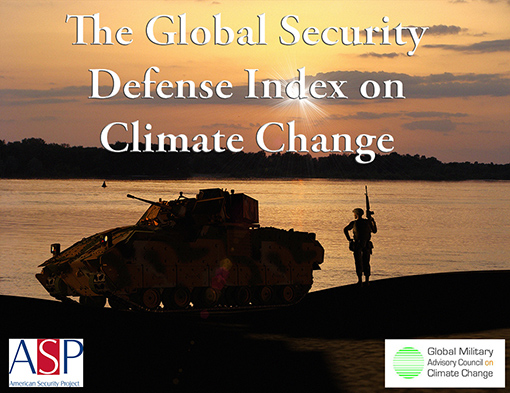
The Global Security Defense Index on Climate Change: Preliminary Results
This evening, the American Security Project released the preliminary results of the “Global Security Defense Index on Climate Change.” This resource was created to detail how governments around the world and militaries in particular plan for the strategic threats of climate change (Open-source documents and speeches make up the primary sources).
As the primary researcher for the Index, it was fascinating to learn how many different nations with such a variety of political systems, economic practices, and geographic locales share a common view on the dangers posed by climate change. More to the point, these states all share the view that climate change (and its direct/indirect effects) should no longer be treated as a purely environmental threat, but rather a full-blown national security issue.
Preliminary Results
Climate Change is a National Security Threat
110 out of 155* – 71% of countries
Climate Change as an Environmental Concern
32/155* – 21% of countries
Climate Change is not a defined Concern
13/155* – 8% of countries
No Information Available
41/196* – 21% of countries
Further information and analysis, including a regional breakdown, is available here.
Layout of the Index
The report divides countries into four groups:
1. Countries which definitively state that climate change is a national security threat. For these countries, climate change has been identified as a threat in either official government documents or in statements by high ranking government officials.
2. Countries that label climate change as an environmental issue. These countries tend to label climate as an issue of concern for humanitarian or disaster response, but are not comfortable with labeling it as a “security” threat.
3. Countries that have not defined it as a concern. These countries are often smaller, and lack security planning documents or apparatus all together.
4. Countries for which there is no information available. These countries are often lacking basic government services – many of them are post conflict, and do not have defined defense strategies at all.
By its nature, this exercise is subjective. Placing countries into specific categories is always going to involve judgments. Instead of seeing all these categories as definitive, it is important to understand that these are all necessarily slightly vague.
The Link Between Climate Change and Security
Climate change is a risk to global security because it increases vulnerability in infrastructure, agriculture, energy and other economic factors. The security consequences of climate change will be determined by how it affects and interacts with local political, social, and economic conditions as much as by the magnitudes of the climatic shift itself.
Academic researchers have been debating the links between climate change and conflict for decades. The academic consensus is that climate change alone is unlikely to be a primary cause of conflict, but it is an important secondary cause.
A changing climate will increase vulnerability by exacerbating tensions related to water scarcity and food shortages, natural resource competition, underdevelopment and overpopulation. It acts as an accelerant of instability, which may lead to violence. These disruptions will burden civilian and military institutions around the world.
The Humanitarian Assistance and Disaster Relief (HADR) efforts almost all national armed forces around the world engage in are an excellent example of a military response to this non-traditional threat. But the findings of the Global Security Defense Index suggest that the majority of nations’ Defense Ministries have a much more robust approach to climate change. Further efforts will be made at ASP to determine whether these countries which view climate change as a national security issue are doing so in a simply rhetorical fashion or rather have operationalized preparations for climate security.
Regardless, the number of nations which address this issue exceeded all expectations. ASP will be completing a final results paper, “clickable” map, and Index of nations as soon as possible to continue conversation on this important topic.






[…] The Global Security Defense Index on Climate Change: Preliminary Results […]